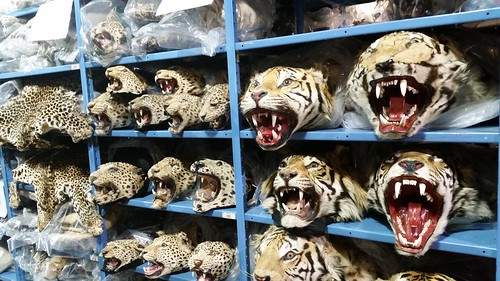逐年穩定成長的犀牛盜獵以及大規模屠殺非洲象,導致物種地區性甚至全球性滅絕,讓世界各國意識到問題嚴重。30日,聯合國大會首次達成野生動植物反走私的決議案,呼籲成員國從供需面著手,預防、對抗和根除野生動植物走私。
 |
| 美國官方扣留的非法野生動物標本。攝影:Ryan Moehring。圖片來源:USFWS(CC BY 2.0) |
保護野生動植物 全球193國誓言反走私
基於「野生動植物是地球自然系統不可或缺的一部分」,且相關走私活動已經逐漸轉變成組織完善、手法細膩的跨國組織犯罪,不利聯合國成員的健康、安全、治理和永續發展,193個聯合國成員首次對此議題表達嚴正關切。
「野生動植物走私不只威脅物種和生態系統,也影響當地居民的生計和觀光景點,讓消除貧窮和永續發展的努力白費。」第69屆聯合國大會主席、烏干達代表Sam Kahamba Kutesa表示。
這份不具約束力的決議,呼籲政府終結邪惡的野生動植物非法貿易,也呼籲成員國透過國內法律,將牽涉組織犯罪集團的野生動植物走私視為「重罪」,並鼓勵成員國協調司法、法律和行政法規的規定,支援證據交換,建立「國家等級的」跨部會野生動植物犯罪工作小組。
最後,成員國政府同意透過立法,加強野生動植物走私的預防、調查和起訴,並強化執法和刑事司法對策。
打擊犯罪 政治關注很重要
華盛頓公約組織(CITES)秘書長John Scanlon樂見此聯合國大會決議。「政治上的決心對於打擊此類嚴重犯罪尤其重要。」Scanlon說。
今年的世界野生動物日上,CITES指出,2014年光是南非就有1,215隻犀牛遭盜獵,等於每8小時就有1隻犀牛被殺。95%的犀牛盜獵發生在犀牛僅存數量最多的南非。
總額高達數十億美元的野生動植物走私往往和組織犯罪、武裝集團和恐怖分子組織有所關連。犯罪集團的涉入,讓南非的盜獵活動從2007年的少於20件暴增至2013年的1,000件,2014年盜獵的犀牛角總價值高達1億920萬美元。
每週查獲1.3隻活體走私 大猩猩有滅絕危機
根據巨猿生存方案(Grasp)的資料,活體巨猿走私對黑猩猩、大猩猩以及非洲和亞洲倭黑猩猩的威脅越來越嚴重,2014年起平均每週都會查獲1.3隻。
 |
| 婆羅洲猩猩。圖片來源:Joan Campderrós-i-Canas |
更多巨猿在走私前就因捕捉和圈養的過程死亡;據GRASP估計,2014年2月至2015年3月間,至少有220隻黑猩猩、106隻猩猩、33隻倭黑猩猩、15隻大猩猩從野外消失。
目前野外約剩下55,000隻婆羅洲猩猩,分成三群不同的亞種。但根據聯合國28日的報告,如果婆羅洲島目前的土地利用政策持續,2080年婆羅洲猩猩將失去80%的棲地。
聯合國環境規劃署、利物浦約翰摩爾斯大學和GRASP合作發表「婆羅洲猩猩的未來:土地覆蓋和氣候改變的影響」。報告指出,婆羅洲森林被大規模轉種植棕櫚油,將讓瀕危的婆羅洲猩猩棲地破碎,多處面臨滅絕。
此外,婆羅洲森林砍伐加速氣候變遷的環境衝擊,可能導致嚴重洪水、升溫並減少農業產量。
Recognizing that wild animals and plants are an “irreplaceable part of the natural systems of the Earth,” the UN General Assembly today urged its Member States to prevent, combat and eradicate the illegal trade in wildlife, “on both the supply and demand sides.”
In its first resolution against wildlife trafficking, the 193-Member Assembly expressed serious concern over the steady rise in the level of rhino poaching and the “alarmingly high” levels of killings of elephants in Africa, which threaten those species with local extinction and, in some cases, with global extinction.
“Illegal wildlife trafficking not only threatens species and ecosystems; it affects the livelihoods of local communities and diminishes touristic attractions. It compromises efforts towards poverty eradication and the achievement of sustainable development,” said Sam Kahamba Kutesa of Uganda, president of the 69th session of the General Assembly, in a statement.
The resolution encourages governments to end the “abhorrent” multibillion-dollar trade often associated with organized crime networks, armed groups and terrorist organizations.
The Assembly expressed concern that illicit trafficking in protected species of wild animals and plants is an increasingly sophisticated form of transnational organized crime that poses a threat to health and safety, security, good governance and the sustainable development of UN Member States.
The resolution calls upon Member States to make illicit trafficking in protected species of wild animals and plants involving organized criminal groups a “serious crime” in accordance with their national legislation. Governments agreed to strengthen the legislation necessary for the prevention, investigation and prosecution of such illegal trade, as well as strengthening enforcement and criminal justice responses.
The resolution encourages Member States to harmonize their judicial, legal and administrative regulations to support the exchange of evidence, as well as to establish “national-level inter-agency wildlife crime task forces.”
John Scanlon, the secretary-general of the Convention on the International Trafficking of Endangered Species, CITES, welcomed the resolution, saying it reflects the heightened level of political concern over the devastating impacts of poaching and illegal trade in wildlife.
“It is particularly important in strengthening the political resolve to combat these serious crimes,” Scanlon said.
On World Wildlife Day March 3, CITES reported that 1,215 rhinos were poached in South Africa alone in 2014 – this translates to one rhino killed every eight hours. About 95 percent of rhino poaching takes place in South Africa, which has the largest remaining populations.
The involvement of organized criminal syndicates has increased poaching from less than 20 in 2007 to over 1,000 in South Africa in 2013, and rhino horn poached in 2014 is valued at a total of up to US$192 million.
The Great Apes Survival Partnership, GRASP, reports that the illicit traffic in live great apes is an increasingly serious threat to chimpanzees, gorillas, and bonobos in Africa and orangutans in Asia, with seizures averaging 1.3 per week since 2014.
Many more great apes die during capture and captivity than ever enter the illicit trade; it is estimated that a minimum of 220 chimpanzees, 106 orangutans, 33 bonobos, and 15 gorillas have been lost from the wild over the 14 months prior to March 2015, according to GRASP.
An estimated 55,000 Bornean orangutans remain in the wild, split into three distinct subspecies.
Over 80 percent of the orangutan’s remaining habitat in Borneo could be lost by the year 2080 if the island’s current land-use policies continue, according to a new United Nations report released Tuesday.
“The Future of the Bornean Orangutan: Impacts of Change in Land Cover and Climate” was published by the UN Environment Programme and Liverpool John Moores University, in collaboration with GRASP.
It warns that the massive conversion of Borneo’s forests for agricultural development, primarily oil palm, will leave the endangered orangutans fragmented and facing extinction in several areas.
In addition, the environmental impact of climate change accelerated by the deforestation of Borneo could result in severe floods, temperature rises and reduced agricultural productivity.
※ 全文及圖片詳見:ENS






